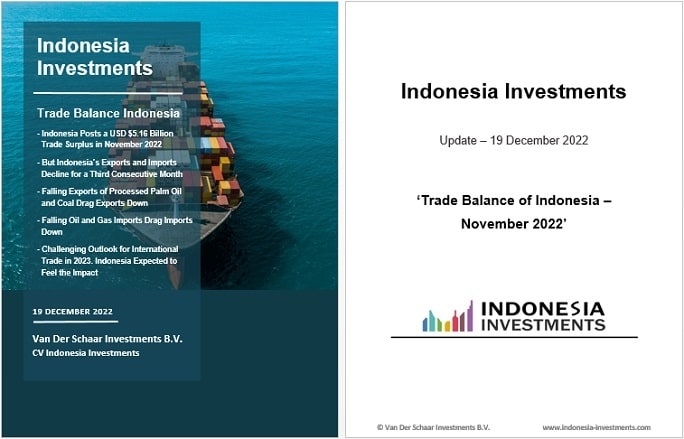Trade Balance of Indonesia: the Continuation of Modestly Sliding Imports and Exports
Over the past two (or three) months we have emphasized that it is worth following Indonesia’s trade performance in the last quarter of 2022 (Q4-2022) as these export and import data should give some clues whether the world (and Indonesia) is bound to experience an economic hiccup at the beginning of 2023.
Many analysts, indeed, predict a recession will occur in 2023 (with the United States, European Union, and Japan being the main victims). If so, it would obviously have a negative impact on Indonesian trade and economy (with sliding global commodity prices being a big challenge for Indonesia’s export performance). On the other hand, China –quite suddenly– decided to ease its COVID-19 restrictions in the second week of December 2022, which should allow a rebound in economic activity in the world’s second-largest economy. Moreover, being Indonesia’s biggest trading partner, rising economic activity in China would be a very positive development for the Indonesian economy.
Besides the recession risk, there remain a range of other uncertainties that continue to plague the world economy, most notably the stagflation risk (a prolonged period of high inflation and low economic growth), the Russo-Ukrainian war that could last for many more years to come, and rapidly increasing interest rates (as central banks around the globe follow the example that is set by the US Federal Reserve).
And at home Indonesia faces challenges too. While the inflation threat seems to have ceased for Southeast Asia’s largest economy, pressures on the rupiah exchange rate remain high amid US monetary tightening (a weak currency typically undermining imports). Moreover, the higher benchmark interest rate of Bank Indonesia (which was raised from 3.50 percent to 5.25 percent over the past couple of months, and is expected to be raised further in the near future) makes it all the more challenging to encourage an acceleration of economic growth.
Amid these uncertainties, we had seen some signs that (could) point at a structurally weakening trade performance, with both Indonesian exports and imports sliding in recent months (after a very impressive trade rebound that started from mid-2020). And so, did we see further signs of weakening trade for Indonesia now the November 2022 trade data have been revealed?
Well, yes, we saw the further weakening of Indonesian trade with both exports and imports sliding (on a month-on-month basis) for the third consecutive month, giving rise to concern that both global demand for Indonesian goods, and domestic demand for foreign goods has been sliding (despite the arrival of Christmas and New Year, a festive season that typically triggers an increase in trade, although it could still be that we will see a small festive-related rebound in December 2022).
[...]
This is the introduction of the article. To read the full text you can order our December 2022 report, or, you can order this article separately by contacting us through email info@indonesia-investments.com or text message to +62.882.9875.1125 (including WhatsApp).
Take a glance inside the report here!

Bahas
Silakan login atau berlangganan untuk mengomentari kolom ini
